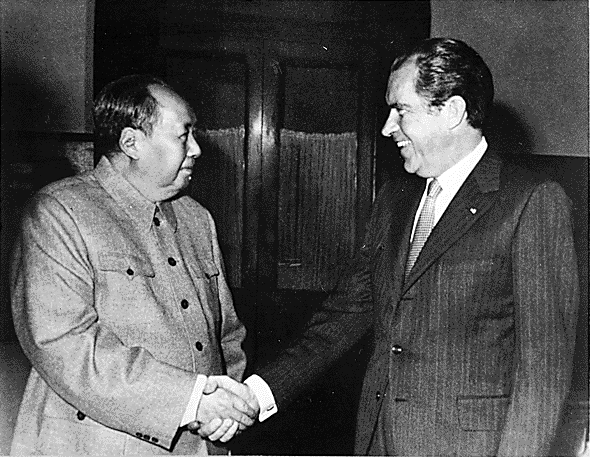In one of the Star Trek films, there is a scene where Mr. Spock says to Captain Kirk, “On Vulcan we have a saying: only Nixon could go to China.” I think the context was a peace treaty between the Federation (humans, good) and the Klingons (alien, bad and an obvious surrogate for the Russians in the original TV series).
It is indeed 40 years since US President Richard Nixon made his historic and at the time utterly surprising visit to Beijing to meet Chairman Mao. Nixon, largely uninterested in domestic policy but fascinated by international relations, made the extraordinary move of allying the capitalist US with the communist People’s Republic of China. The significance of Spock’s comment is that only a President with a long record of forcible opposition to communism could get away with this apparent volte face.
By comparison, Democrats are often thought to be likely to go to war and prolong it, for fear of being seen as soft on the enemy. So President Lyndon Johnson may, it is argued, have felt obliged to escalate the Vietnam war that was bequeathed to him by the late President Kennedy, to ensure political support for his cherished domestic welfare reforms (known at the time as “the great society”) in the mid-1960s. (Christopher Hitchens argues that Kissinger and Nixon later quite deliberately prolonged the Vietnam war for their own political reasons, at the cost of about 30,000 US combat deaths and 3 million Vietnamese civilian casualties, which would amount to a shocking waste of life, but this is of course contested.)
Nixon’s boldness was matched by that of Mao. It must have been even more difficult for him to explain to the veterans of the communist revolution how it was now right to greet the head of the capitalist world and sign a friendship agreement with him. Of course Mao was a dictator so had less to worry about on this score, as anyone disagreeing with him would have been “purged”. Nixon’s later behaviour over Watergate and the bombing of Cambodia suggested he would have envied Mao his freedom of action.
The logic of the deal was my enemy’s enemy is my friend: the Soviet Union. Ostensibly an ideological friend of communist China, the USSR was historically and geopolitically a rival. The two had already fallen out, partly because Mao was unimpressed with Kruschev’s denouncement of Stalin’s “excesses”. (Mao and Stalin had in common a willingness to tolerate millions of deaths in order to make the proverbial omelette.) By the late 1960s the USSR was asking the US if it wanted to join, or at least acquiesce, in a pre-emptive nuclear attack on China to stop it becoming a serious rival. Quite properly the US said no and China has this to thank the US for, since it seems that the USSR was quite serious and at times Mao evacuated the government from Beijing for fear of a nuclear attack.
This three power scenario was pre-figured by George Orwell in his book “1984”. China was at the time not yet a serious economic or military rival to the USSR, let alone the US. But thanks to the policies followed after Mao’s death, China is just a few years away from being the world’s largest economy. The USSR is no more and Russia is a dying empire supported largely by the (currently) high price of hydrocarbons. The US is increasingly anxious about the rise of China so I doubt there will be celebrations next week at the anniversary of Nixon’s visit to China.



Leave a Reply